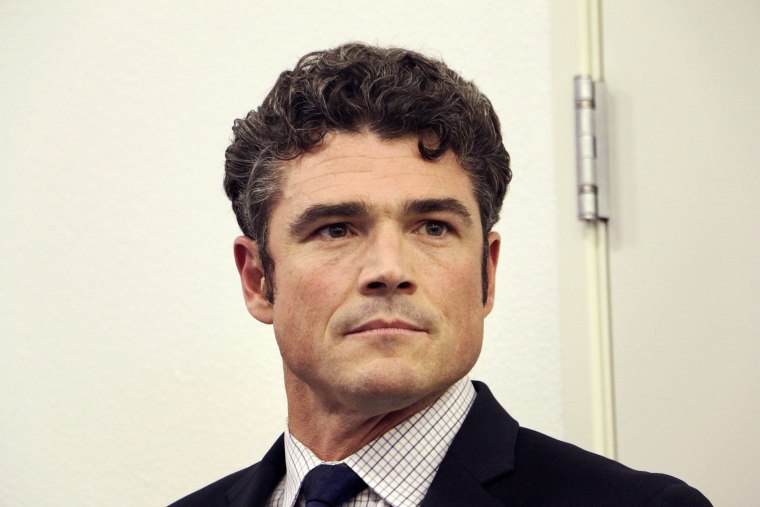In the 2022 midterms, a number of far-right candidates cruised to primary victories with former President Donald Trump’s backing — only to blow key races with a general electorate who viewed them as too extreme.
And now, Republicans are nervously bracing for many of them to run again.
At least four of these candidates who ran, and lost, in 2022 are making it known that they’re interested in running again in 2024 — or have already announced bids. They’re testing the party’s commitment this cycle to emphasize “candidate quality” and offering Democrats a sliver of hope as they navigate a difficult Senate map and a narrow field of swing House races.
Jim Marchant, the failed GOP secretary of state nominee in Nevada, recently launched his campaign to challenge a Democratic Senate incumbent. Kari Lake, who narrowly lost her gubernatorial bid in Arizona last fall and continues to lose her court battles challenging the results, is on the verge of joining him in a Senate bid for 2024.
Many party leaders breathed a sigh of relief Thursday night when Doug Mastriano, a far-right state senator in Pennsylvania who decisively lost his race for governor last year, announced he would not be launching a Senate campaign.
But at the House level, Republicans Joe Kent in Washington and J.R. Majewski in Ohio — two MAGA-aligned candidates who hugged Trump tightly but fell short in districts Republicans were favored in — have already launched their next bids. Others may soon join.
All of these candidates put Trump’s false claims of a stolen election front and center in their campaigns, helping them get through contested primaries but putting them at a disadvantage with independents in the general election. Their defeats have led some party leaders to suggest they may take a more active role in the primary process.
Sen. Steve Daines, R-Mont., chairman of the National Republican Senatorial Committee, told NBC News in an interview last month that Republicans need to appeal to voters “beyond the Republican base” in order to pull off victories next fall — something he said will in part rely on campaigning on “the future, not looking at the rearview or the past.”
“Winning elections is about addition and multiplication, not subtraction and division,” he said. “And so that’s something that every candidate got to look in the mirror and say, 'Am I a candidate that can first bring the Republican base together and also extend an appeal to independent voters?' That’s the recipe.”
Recently, Lake met with Daines and six other Republican senators to discuss her potential Senate bid, a national Republican strategist said. Daines said he has asked prospective candidates to share with him a plan for how they can win both a primary and a general election.
Daines, who endorsed Trump last month, believes the former president will be helpful with whom he backs or does not support in primaries. But last year, it was Trump who helped elevate many of these candidates through contested primaries with his sought-after endorsement.
Trump’s campaign did not answer requests for comment about whether he would be supportive of some of these same candidates this time around.

Terry Sullivan, who was campaign manager for Florida Sen. Marco Rubio’s 2016 presidential campaign, said that while many candidates do improve during a second run, there were “a lot of really crappy candidates last time.”
“And if you’re just a fundamentally flawed candidate the first time you run, you’re still a fundamentally flawed candidate the second time you run,” he said, adding, “You’ve always had the weirdo candidates that run no matter what. And the difference now is, they’re kind of given more oxygen than they ever did in the past, and they’re actually winning primaries.”
If anything, what has Republicans most concerned about some of these candidates is, as Daines put it, an insistence on relitigating the 2020 (and perhaps 2022) elections.
That seems unlikely to change. For example, Lake on Tuesday announced she would petition the Supreme Court to hear her latest case seeking to invalidate her 2022 defeat at the hands of Katie Hobbs, then-Democratic Arizona secretary of state.
“I think if Kari could recalibrate her message away from the stolen election claims, she’s got enough raw political talent to make that race competitive,” the national Republican strategist said.
But that was not transferable to other 2022 losers seeking Senate seats this cycle.
“No,” this person said. “I think that’s Kari Lake-specific.”
In a statement, Lake said: “Electing Republicans up and down the ballot is undoubtedly what is needed to save our great Nation,” adding a request to “Stay tuned” for a “major” announcement within weeks.
Marchant did not respond to a request for comment.
Democrats have mostly stayed quiet on the developing GOP primary field, but outside groups have left the doors open to boosting more extreme candidates they see as easier to beat, just as some Democrats did last cycle. In Nevada, Democrats have already started to take aim at Marchant, highlighting comments he made on a webcast earlier this year that seemed to endorse the military intervening in the 2024 vote.
“There’s never been a larger gap between what kind of candidates Republican primary voters demand and the kinds of candidates general election voters will accept,” Democratic strategist Rich Luchette said. “Republicans underperformed in the midterms because they nominated people who want to restrict reproductive rights for women, cut Medicare and Medicaid, and support right-wing political violence, including the storming of the Capitol on Jan. 6.”

Among competitive House races, few frustrated Republicans more than the battle last year in Toledo, Ohio, where long-entrenched Democratic Rep. Marcy Kaptur was seen as vulnerable in a 9th Congressional District redrawn to be friendlier to the GOP.
Majewski — an Air Force veteran who, before winning his party’s nomination, was best known for painting a Trump banner on his lawn — lost to Kaptur by 13 points, his campaign scuttled by an Associated Press report that he had misrepresented his military service. Others on the ground in the district complained about what they saw as a lazy and undisciplined campaign that failed to activate grassroots voters and take advantage of Kaptur’s weaknesses.
Undeterred, Majewski is angling for a rematch in 2024. GOP leaders in Ohio and nationally worry about a scenario in which his recent familiarity with voters carries him out of a crowded primary and prevents them from picking up a winnable seat.
“I can stomach a MAGA candidate that can win if they do something right, if they bring something to the table to help them get elected,” said one unaffiliated Republican official in the Ohio 9th District who requested anonymity to speak candidly. This person added a Majewski nomination “unquestionably” locks in a GOP loss.
Another Republican operative involved in races across Ohio quipped that it’s time for Majewski to “repaint the lawn, not re-announce a campaign.”
Majewski did not respond to a request for comment.

In Washington’s 3rd Congressional District, Kent, who promoted Trump’s false claims of a stolen election and expressed skepticism over the integrity of the vote count in his own race as ballots were being tallied, believes 2024 will prove much more favorable for him than did his last bid. (He ultimately conceded and accepted the results.)
Kent was able to defeat then-Rep. Jaime Herrera Beutler, R-Wash., in a primary last year after she voted to impeach Trump for his role in the Jan. 6 attack on the Capitol, only to lose against Marie Gluesenkamp Perez in a district that tilts toward the right.
In a recent memo provided to NBC News, Kent’s campaign argued that his 2022 loss was due to him being widely outspent during the primary and because his general election opponent did not yet have a record in Congress he could run against. This time, he has no incumbent to face in a primary and can go on the offense against a Democratic rival who has a record “to expose,” the memo said.
“Every hurdle I faced in 2022 has been removed for 2024: running against a same-party incumbent, facing a barrage of establishment-backed attack ads in the primary, lacking funding from the DC Republicans in the General Election, depressed rural Republican voter turnout, and a Democrat opponent that didn’t then have the radical voting record she has now,” Kent said via email.
He added his narrow defeat was well within the typical rightward swing the district takes in presidential years.
“We have great reason to be optimistic about 2024,” he said.
That’s not the only thing about the presidential cycle that could work in some of these candidates’ favor. As Sullivan said, a presidential cycle means way more reporters will be focused on Des Moines and Manchester, New Hampshire, rather than on Pittsburgh and Phoenix.
“You’re going to have a lot less media scrutiny across the board,” he said. “It’s fundamentally different how it’ll be covered.”


